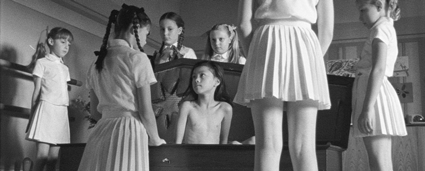Otherworldly ambiance in a dingy, run down universe for young girls
If French cinema remains the strongest in Europe, both commercially and aesthetically, part of the reason may be the number of female directors working there. “Innocence” is the latest in a string of memorable debut films by French women.
In the U.S., the indie dream of making a splash at Sundance, getting picked up by a major distributor, and launching a career has been almost exclusively male. Of course, many women have the same goals; they just have far more difficulty achieving them. It’s hard to imagine an American counterpart to Claire Denis. A woman wanting to make a film like “Beau Travail” would probably have to make it on DV for a $50,000 budget, and she would be unlikely to go on working regularly. The one film by an American woman to make a splash this year, Miranda July’s “Me and You and Everyone We Know,” exemplifies some of current indie cinema’s worst qualities, especially a rote quirkiness. It seems influenced by Todd Solondz’s “Happiness” but waters down its misanthropy to the point where the characters seem encased in protective bubbles.
Lucile Hadzihalilovic’s “Innocence” has been made in an entirely different world—like Denis’ films, it is unique, enigmatic, and visionary.
“Innocence” is based on an 1888 novella by Frank Wedekind entitled “Mine-Haha, or the Corporal Education of Young Girls.” The film opens with a rumbling sound and a series of puzzling images. Eventually, a coffin is transferred through a passageway. It arrives in a house, leading to the “birth” of a nearly naked six-year-old girl, Iris (Zoé Auclair). She’s just entered a strange, isolated boarding school, peopled entirely by young girls; the oldest are just about to enter puberty. They live together in five houses and study dance, gymnastics, and biology. In some respects, it’s liberating for the girls to live apart from adults, but rebellion has lifelong consequences. Anyone who tries escaping from the school will be forced to remain there as a servant, while the others eventually get to leave. Every night, Bianca (Bérangere Haubruge) puzzles the other girls by leaving the house to go to a secret meeting.
At a Q&A after a screening of “Innocence” at the Walter Reade’s “Rendezvous with French Cinema” last spring, an audience member asked whether the film is set in the future. He pointed to several lines referring to evolution, particularly “tomorrow’s children will doubtless be very different,” as evidence. Hadzihalilovic said that she intended to set it in the ‘60s. While an otherworldly ambiance runs through it, “Innocence” takes place in a dingy, slightly run-down universe. The use of natural light makes interiors look rather dim. On the other hand, the forest exteriors are stunning.
The girls dance to crackly albums played on a turntable, not CDs. The soundtrack uses music sparingly––we rarely hear it unless characters are listening to records on-screen. In place of a score, the distant sound of a train and a large clock’s metronome tick-tock are omni-present
The first 75 pages of Kazuo Ishiguro’s recent novel “Never Let Me Go” are so similar to “Innocence” that the writer must have drawn on Wedekind’s novella. However, Ishiguro eventually explains his narrative with a sci-fi conceit, while Hadzihalilovic avoids such devices. “Innocence” isn’t a horror film, but it often plays like one, even though nothing particularly dangerous happens. One other film has been inspired by Wedekind—Italian director Dario Argento’s 1977 “Suspiria,” set at a boarding school that turns out to be a witch’s lair. Argento reveled in gore, loud music, and blazing colors, while “Innocence” strives for subtlety. Nevertheless, its final half hour feels close to “Suspiria,” especially in its depiction of girls ferreting out a world’s hidden dangers and literal secret passages.
Hadzihalilovic films water like Robert Mapplethorpe photographed flowers. Her images of it carry a near-fetishistic charge, especially when she uses extreme close-ups that turn into abstract compositions. “Innocence” begins and ends in water. Rather than a conventional character arc, it’s a story about how a girl gets from an isolated brook to a public fountain. When it was recently released in Britain, several critics suggested that it might inadvertently appeal to pedophiles. However, Hadzihalilovic scrupulously keeps sexuality off-screen; sensual impulses pop up in the film in other forms.
As an outline, “Innocence” might sound like a pat metaphor for childhood. As an experience, it’s genuinely uncanny. Despite the story’s strangeness, the child actors give quite believable, spontaneous-seeming performances that counter its dreamlike feel. However, Hadzihalilovic explains little and resolves nothing. She expresses a worldview derived from the way children often see life—as a maze of mysterious rules and regions from which they’re excluded—while hinting that the film’s story is a Freudian prelude to something much larger and darker.
“Innocence” relies a bit too heavily on creepy portent alone to sustain the viewer’s interest for almost two hours. Otherwise, it stands alone among recent cinema, French, female-directed or otherwise, for its ability to create a beautiful, resonant private world.
gaycitynews.com

































